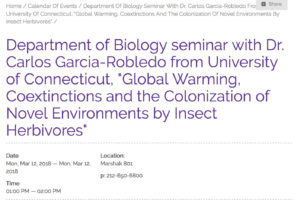Thank you Ana Carnaval and Andrea Paz for the invitation to the Department of Biology – City College of New York. Such a great department!
Author: Carlos
Diego Salazar – February 15 -Departmental Seminar: The diffused evolution of defensive plant chemistry
We are very excited about hosting Diego Salazar (Florida International University), our next departmental seminar speaker.
Diego’s research focuses on interactions between tropical plants and insect herbivores. Some of his research topics include the effect of chemically-mediated plant-herbivore interactions on plant species distributions, functional and phylogenetic diversity, and the evolutionary pressures that spawn and maintain these species “swarms”
(Please check Diego’s lab website here)
Please join us for Diego’s seminar this Thursday, February 15 at 4 pm in Biophysics 131.
Also, if you want to meet Diego, sign-up for a slot in his schedule here.
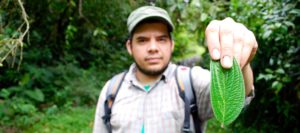
Welcome to Christina Baer – Postdoctoral Researcher
We are thrilled to welcome our new postdoctoral researcher, Dr. Christina Baer. Christina finished her Ph.D at the University of Missouri – St. Louis. She is interested in plant and insect ecology, insect behavior, and natural history. Christina will participate in our project exploring demographic responses of organisms in changing environments and our project estimating coextinction risk in complex food webs.
Welcome Christina!
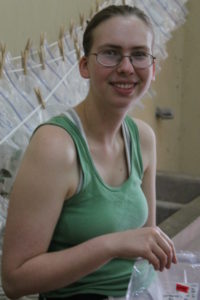
Carlos visiting Brown University
Friends in Brown. I will be visiting the Department of Biology, Brown University to give the Departmental Seminar. See you soon!
October 10, 2017 12:00 PM – 1:00 PM Biomed Center, Room 291 (Eddy Auditorium), Brown University.
Welcome to the lab Laura, Sarah and Meli
We are thrilled to introduce our new lab members, Laura Bizzarri (Master student), Sarah Hurl (BS/MS student) and Melissa Sanchez (Technician at La Selva). [Read more about their exciting projects here!]
Carlos visiting PennState September 11 – 13
Friends at PennState, I will be visiting the Department of Biology to give a Departmental Seminar on September 12. Here is the link to the events calendar:
http://bio.psu.edu/news-and-events/seminars/biology/fall-2017/tbd
See you soon!
We received an OTS Emerging Challenges in Tropical Science Research Fellowship – Thank you OTS!
I am thrilled to announce that we received one of the Emerging Challenges in Tropical Science Research Fellowships by the Organization for Tropical Studies.
These awards, funded through the generous support of Rudy and Sally Ruggles, provide 10 weeks of station fees at La Selva.
This is a terrific opportunity for early career scientists to start new long-term projects at OTS field stations in Costa Rica. For more information on these awards click here
Carlos invited to Departmental Seminar University of Florida
I will be visiting the Department of Wildlife Ecology and Conservation, University of Florida giving the Departmental Seminar.
University of Florida
Mondays September 26 – 3:30PM, in 112 Newins-Ziegler Hall.
Carlos Garcia-Robledo
University of Connecticut
“Global Warming, Coextinctions and the Colonization of Novel Environments by Insect Herbivores”
Carlos invited to Departmental Seminar University of Missouri – St. Louis
Spring 2016
All seminars are held in R121 Research Building unless noted.
September 20, 2016 at 2 p.m.
Dr. Carlos Garcia-Robledo
University of Connecticut
Host: Bob Marquis
“Global Warming, Coextinctions and the Colonization of Novel Environments by Insect Herbivores”
Project T.A.R.D.I.S. – First stop: La Selva

Do you remember Dr Who’s spacecraft and time machine – the Time and Relative Dimension in Space A.K.A. the TARDIS? A machine that can take you anywhere in space and time?
A TARDIS would be a great piece of equipment to instantaneously visit remote places along elevational gradients, or the future. An ideal tool to answer key questions regarding climate change!
Well, technology now lets us mimic temperatures and other environmental variables anywhere – get an incubator, a growth chamber and there it is! a portal to a novel environment.
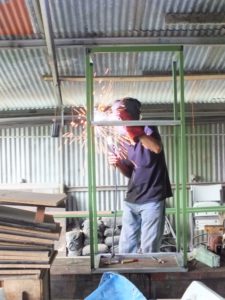
This summer, at La Selva Biological Station – Costa Rica, we built a portal to different temperatures experienced by insects living along the La Selva Braulio Carrillo mountain gradient.
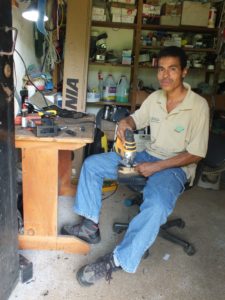
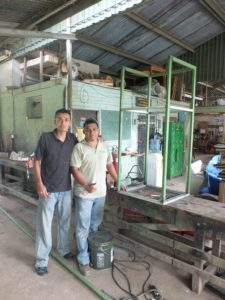
Together with the workshop crew at La Selva, we built a set of incubators that mimic current temperatures and temperatures expected under projected global warming in tropical rain, premontane and montane forests.
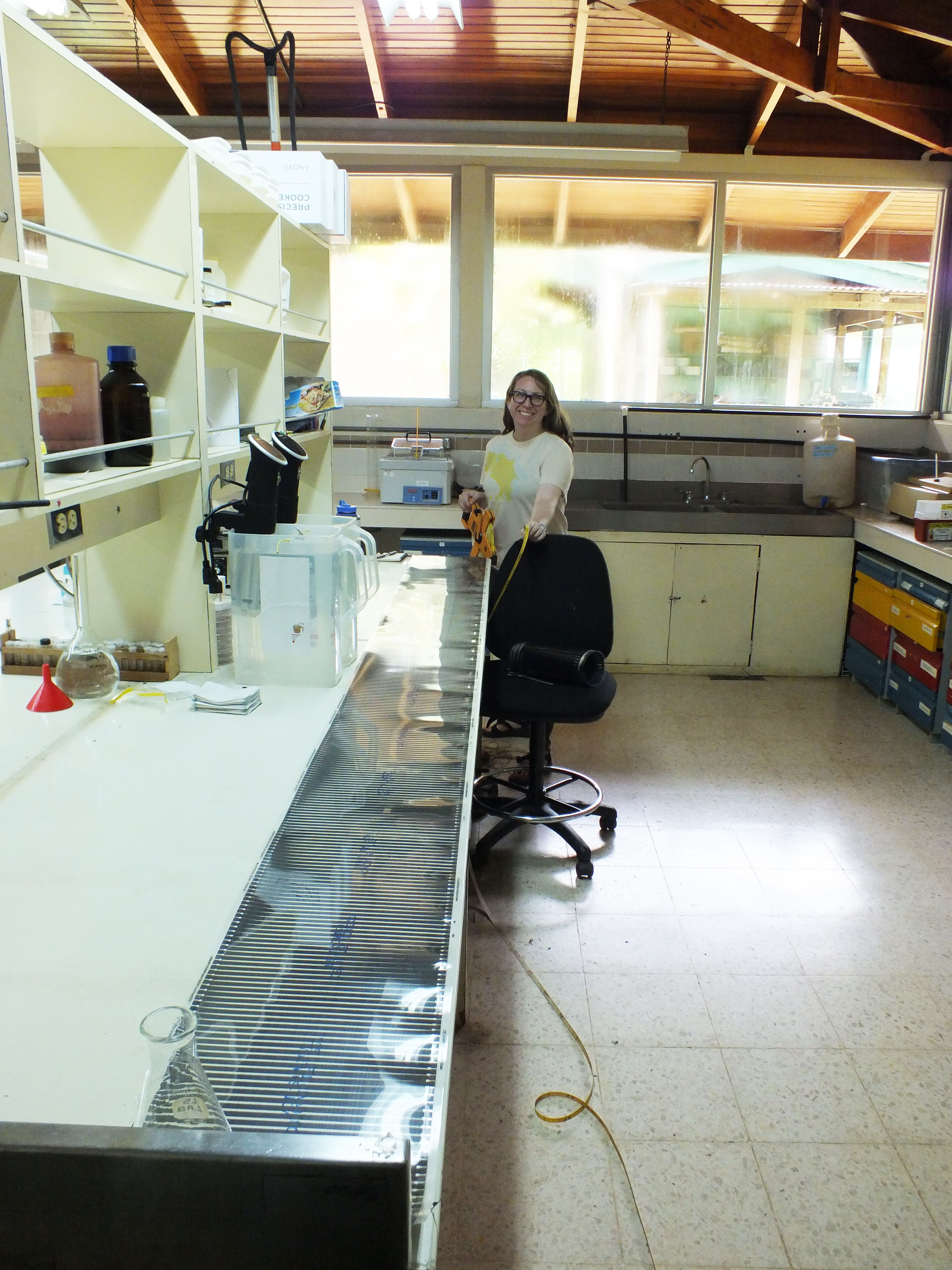
One of the objectives of our project is to build accurate and inexpensive equipment, with materials that are locally available. Our collaborators working in different countries can easily build the same setup and explore the effects of temperature on organisms living at different elevations and latitudes.
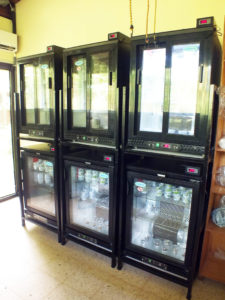
Using these incubators as portals to current and future temperatures along tropical mountains, we are starting to elucidate the physiological and demographic responses of insects living at different elevations under projected global warming.
This is the first of many laboratory setups to be positioned along the La Selva – Barva elevational gradient. Collaborators in Mexico are also building a similar lab to explore the responses to global warming in insects at higher latitude.
We call this project Thermal and Altitude Research in Dynamic Invertebrate Systems – Welcome to project TARDIS

